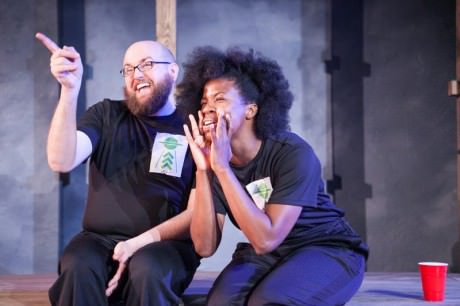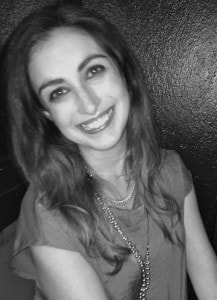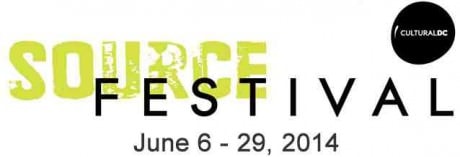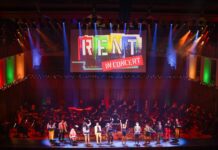The Playwright’s Playground is a monthly in-depth conversation with a local female playwright in the D.C. theatre community. Female theatre artists make up more than 50 percent of those involved in the theatre, yet the number of female playwrights being produced is dramatically lower. In this continuing Series, I will interview and introduce DCMTA readers to the many talented playwrights in the DMV area to learn about their writing process, their inspirations, and their motivations and struggles to write and produce their art.
In this special edition, I am overjoyed to feature the ten female playwrights of Source Festival 2014. Led by the Artistic Direction of Jenny McConnell Frederick, Source Festival 2014 is a three-week performing arts project of CulturalDC that cultivates new work in a nurturing environment and spotlights the witty, incisive, and thought-provoking writing from today’s emerging American playwrights. Building the path for the next generation of outstanding performing artists, The Source Theatre Festival (June 7-29) presents three themed full-length plays (Mortality, Revenge, Quests), three experimental Artistic Blind Dates of created original work, and three thematically grouped programs with six 10-Minute related plays to enjoy.
Sarah Bernstein
Selected from more than 500 nationwide submissions, Sarah Bernstein’s play The Narrow Gate Is one of the six ten-minute plays featured under the Mortality theme in this year’s Source Festival 2014.
Sarah Bernstein is a New York- based playwright who graduated with Honors in Playwriting from Brown University where she studied with Bonnie Metzgar and Paula Vogel. She has worked on all sides of the New York theatre world including championing new plays as Literary Manager and Acquisitions Director at Playscripts. The Narrow Gate play was written specifically for the Source Festival and is her first play produced in DC.
____________
Why do you write, and more specifically why do you write plays?
I think I write as a form of acknowledgment. There’s so much of our experience we don’t acknowledge, even to ourselves. That feels to me like a big part of the original creative impulse, though I can’t speak for every artist. I like to think that the first artist painted a bison on a cave and then said, “Hey guys, doesn’t this look like a bison?” and everybody said, “Oh, yeah” and then that cave artist felt a real sense of accomplishment, but also a nagging uncertainty about the actual value of what he had done.
I write plays specifically because I tend to see everything in terms of emotional relationships. I see emotional relationships in places where they don’t exist, in math equations, and pieces of music, and traffic jams. I’m obsessed with our interpersonal dynamics and I’ve found the stage to be the best place to explore them.
How disciplined are you about writing every day? What is your writing process?
I’ve definitely found some environments to be more conducive to writing than others, but I’m wary of getting too attached to any particular routine because I do like to write every day and sometimes the only chance I have is in a waiting room or subway car or a midtown Starbucks full of babies. If I can, I like to write outside of my apartment in order to maintain the work-home divide, but that’s easier said than
How do you pay the bills? Does writing plays or working at an artistic endeavor pay the bills, or do you work another job to make ends meet?
At present, playwriting does not pay the bills. To support my habit, I teach creative writing classes for children, I write grants for non-profits, and I consult for publishers and playwrights. Luckily, each and every one of those things is challenging and informative and satisfying in its own way. Every writer dreams getting paid to write (…the things they wanna write), but a diversity of experience, provided it still affords you time for your own projects, is never a bad thing.
When did you consider yourself a professional playwright, or do you?
I think artists actually have more of a hang-up about this than the rest of the world does, which is funny. I’ve had lots of tortured conversations with other writers about, “How do you introduce yourself?” “Do you say you’re a dog-walker who writes plays or a playwright who walks dogs sometimes?” while for the last ten years, my non-writer friends have been saying, “You should meet my friend Sarah; she’s a playwright.” As I’ve had more experience seeing my plays through development and production, I’ve started to introduce myself as a playwright first. When people get excited by that, I want to qualify it – “No, no, I just mean I write plays sometimes” – but that’s the thing they’re excited about. They’re excited that I write plays, not by some arbitrary status they presume I’ve earned in my field.
Source Festival Play
Sarah, what are the themes, characters and plot of your play, The Narrow Gate?
I chose to write about mortality because I was interested in the powerful appeal immortality has for so many people. The play’s title, The Narrow Gate, refers to Matthew 7:13: “Enter through the narrow gate, for wide is the gate and broad is the way that leads to destruction,” which I think sums up the way a lot of traditional and non-traditional faiths look at life vs. afterlife. It’s “live your life within these narrow parameters and you will be rewarded with eternal life in the hereafter.” A lot of folks see that as a good deal. They make big sacrifices in order to get that eternal reward. In my play, Sam and Diane, two members of what most of us would call a cult, give up everything they once cared about for the promise of eternity. But as they stand on the threshold, they begin to question the bargain they are making.

The practices of cults strike many of us as frightening or ridiculous (The Narrow Gate) is also an allusion to Heaven’s Gate, a cult whose mass suicide received a lot of sensational coverage when I was a kid) but I think it’s natural to want a larger context in which to understand your small, finite life, and that’s what cults provide. It’s very scary to imagine that it’s up to us to endow our lives with meaning before we shuffle off, as it were. Sam and Diane both entertain this daunting possibility, but they respond to it in different ways.
What has been your participation with the production we will see during the Source Festival?
I’ve had an ongoing conversation with my wonderful dramaturge, Kate Coughlin, who is also Associate Producer of the festival. Kate has actually had a longstanding fascination with cults and is super knowledgeable! She offered some very helpful history in the development process. As I’m based in New York, I have not had a chance to see the play rehearsed or performed yet. I am very excited to attend the performance on June 27th.
How many drafts went into what we will see on stage?
I tend to write ten-minute plays fairly quickly once I know what they’re about. The play has benefitted from some sharp notes from Kate Coughlin and my director, Angela Pirko, but the script is close to the one I submitted to the festival in January.
What do you like most about this script and has it ever been performed on stage before?
This play was written for the Source Festival and is my first play produced in DC. I’ve never seen it performed. Part of my experience on the 27th will be discovering whether my favorite things about the script are my favorite things about the production. Playwriting is an odd art form because you don’t really know what you have on your hands until you see it staged. There are always surprises in the page to stage transition. That said, what I like most about the script is the way the tension is a source of both humor and anxiety.
What has been your biggest challenge with this script? How did you come up with the idea for it?
I didn’t grow up in a religious household, so there wasn’t a lot of talk about eternal life one way or the other. Like a lot of kids, though, I was obsessed with the idea of eternity. I would think about time and space extending forever and be completely horrified. When I got older, I was further unsettled to discover that not everybody shared my horror. Some people told me they found the idea of an infinite, unknowable universe “comforting”; eternal time, for them, put things in perspective.
Writing this play was challenging because it required me to identify with and investigate this point of view. I set the play in a cult because that represents for many of us the extreme limit of the Narrow Gate-Eternal Life bargain. I called the characters Sam and Diane because I was re-watching Cheers on Netflix.
A Deeper Look & Inspirations
Do you have a favorite living female playwright that you recommend to others or would like to see performed in the DC area?
There are lots of up and coming women playwrights whose work evokes a universal, unexpressed angst. My two favorite plays of last season – Bethany by Laura Marks and Phoebe in Winter by Jen Silverman – tell very different stories in very different ways, but share a willingness to explore some unpleasant, primal features of human nature. They presented these truths in a way I was both horrified by and grateful for. Hopefully DC audiences will have a chance to become better acquainted with both of these writers soon.
As a writer, what has been the biggest struggle getting your work read and produced?
Someone once told me that if you receive one acceptance for every hundred submissions, you’re doing alright – which is both an encouraging and a terrifying idea. That’s probably hyperbole, but you do have to submit a lot, mostly because that’s how you find the kind of artistic soulmates that will help you grow and advance in your career. And you have to accept that there will be some unrequited loves as well. I’ve been rejected by companies and thought, “How could they do this?! I’m so perfect for them!” But you can’t get hung up on those. There are lots of fish in the sea.
What inspires you to continue as a playwright, and who are your playwriting inspirations?
I’m inspired by plays that capture the unacknowledged undercurrents of life, plays that express the fear and shame and confusion that colors all experience, but is rarely discussed, even among intimates. I think my job as a playwright is to present the parts of experience that are universally felt, but difficult to share. When I see someone doing this job well, it encourages and inspires me. As an objective, it’s more abstract than “creating complex characters” or “building stakes,” so when I want to remind myself of what I’m striving for, I’ll reread Edward Albee’s A Delicate Balance or Harold Pinter’s The Birthday Party or Caryl Churchill’s Cloud Nine.
What are your thoughts about the disproportionate number of female playwrights consistently being programmed by theatre companies?
I think it reflects a lingering tendency (that exists across all media) to see womanhood as a sort of niche issue. Meanwhile, manhood – and more specifically, straight, white, manhood – has been standing in for personhood for hundreds of years. There is an expectation that women and people of color and LGBT people will look at Willy Loman and identify with his universal qualities, whereas the perspectives of gay characters or woman playwrights are valued more often for their specificity than for their transcendence.
That’s why an all-female season is a statement but an all-male season is a coincidence. I think the way we talk about and encourage diversity in the theater, though well intentioned, can exacerbate this. There’s a lot of talk about “exciting new perspectives” that can make an audience (or a Literary Manager) feel like what “diverse” plays offer is a voyeuristic glimpse into another world, rather than an affirmation of shared humanity. But any good play, whoever wrote it, offers both. If we really believed that, theaters might book all-female seasons just by coincidence too.
The Narrow Gate is performed as a part of the Source Festival – MORTALITY: Six 10-Minute Plays, which are playing on June 22, 4 pm and June 27, 2014 at 6:00 PM at THE SOURCE THEATRE FESTIVAL 2014 (June 7 – June 29, 2014) at Source– 1835 14th Street. NW, in Washington, D.C. For tickets, call OvationTix customer service toll-free: 866-811-4111, or purchase them online. Source is located 2 Blocks from U Street/Cardozo Metro Station on the Yellow & Green Lines.
LINKS
The Playwright’s Playground: SOURCE Festival 2014 – An Interview with Playwright Susan Goodell on Her Play: ‘After Unlocking the Universe.’
The Playwright’s Playground: SOURCE Festival 2014 – Interview with Playwright Elizabeth Archer on Her Play: ‘Old Gray Devil.’
The Playwright’s Playground: SOURCE Festival 2014 – Interview with Playwright Molly Hagan on Her Play: ‘The Wild Ones’
The Playwright’s Playground: SOURCE Festival 2014 – Interview with Playwright Marine Gassier on Her Play: ‘The Reluctant Genie of Niamey.
The Playwright’s Playground: SOURCE Festival 2014 – Interview with Playwright Erin Bregman on Her Play: ‘A Bid to Save the World’
The Playwright’s Playground: SOURCE Festival 2014 – Interview with Playwright Mariah MacCarthy on Her Play: ‘Painted.’






